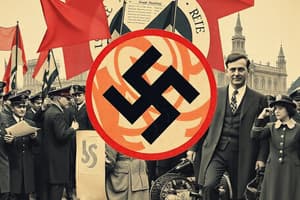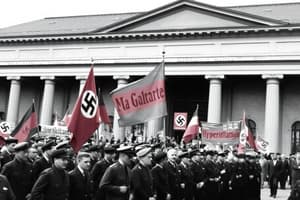Podcast
Questions and Answers
What was the primary goal of Nazi education for children?
What was the primary goal of Nazi education for children?
- Teaching scientific principles
- Fostering international understanding
- Promoting loyalty and obedience (correct)
- Encouraging critical thinking
The Hitler Youth organization prepared young people for peaceful humanitarian work.
The Hitler Youth organization prepared young people for peaceful humanitarian work.
False (B)
What did the Nazi ideology emphasize about the role of women?
What did the Nazi ideology emphasize about the role of women?
The role of women as mothers responsible for producing pure-blooded Aryan children.
The Nazis used ______ to spread their ideology and justify their actions.
The Nazis used ______ to spread their ideology and justify their actions.
Match the following concepts with their descriptions:
Match the following concepts with their descriptions:
What political system was introduced by the Weimar Republic?
What political system was introduced by the Weimar Republic?
The Great Depression had a positive impact on Germany's economy.
The Great Depression had a positive impact on Germany's economy.
What term refers to the systematic genocide of Jews and other minorities during Nazi Germany?
What term refers to the systematic genocide of Jews and other minorities during Nazi Germany?
The Weimar Republic was established in the year ______.
The Weimar Republic was established in the year ______.
Match the following challenges faced by the Weimar Republic with their descriptions:
Match the following challenges faced by the Weimar Republic with their descriptions:
Which region did France occupy to force Germany to pay reparations?
Which region did France occupy to force Germany to pay reparations?
The Nazi Party's ideology was based on democratic principles.
The Nazi Party's ideology was based on democratic principles.
What radical political event in Germany was inspired by the Bolshevik Revolution?
What radical political event in Germany was inspired by the Bolshevik Revolution?
What principle led to the instability of the Weimar Republic?
What principle led to the instability of the Weimar Republic?
The Fire Decree and the Enabling Act strengthened democratic institutions in Germany.
The Fire Decree and the Enabling Act strengthened democratic institutions in Germany.
Who was the economic policy leader for Hitler aiming at full production and employment?
Who was the economic policy leader for Hitler aiming at full production and employment?
The systematic extermination of Jews during the Nazi regime is known as the __________.
The systematic extermination of Jews during the Nazi regime is known as the __________.
Match the Nazi policies with their descriptions:
Match the Nazi policies with their descriptions:
What was one of the promises made by Hitler during his rise to power?
What was one of the promises made by Hitler during his rise to power?
The Nazi ideology considered the Aryan race to be inferior to other races.
The Nazi ideology considered the Aryan race to be inferior to other races.
Name one country that Germany invaded as part of its expansionist policy under Hitler.
Name one country that Germany invaded as part of its expansionist policy under Hitler.
Flashcards
Weimar Republic
Weimar Republic
Germany's government after World War I, a democratic republic with a federal structure and universal suffrage.
Nazi Party
Nazi Party
The political party that rose to power in Germany, led primarily by Adolf Hitler, with a totalitarian ideology.
Hyperinflation
Hyperinflation
Extremely rapid and uncontrolled increase in prices, significantly destabilizing the economy.
War Guilt Clause
War Guilt Clause
Signup and view all the flashcards
Totalitarian Ideology
Totalitarian Ideology
Signup and view all the flashcards
Holocaust
Holocaust
Signup and view all the flashcards
Great Depression
Great Depression
Signup and view all the flashcards
Reparations
Reparations
Signup and view all the flashcards
Nazi Education
Nazi Education
Signup and view all the flashcards
Hitler Youth
Hitler Youth
Signup and view all the flashcards
Nazi Cult of Motherhood
Nazi Cult of Motherhood
Signup and view all the flashcards
Nazi Propaganda
Nazi Propaganda
Signup and view all the flashcards
Complicity in Nazi Crimes
Complicity in Nazi Crimes
Signup and view all the flashcards
Article 48
Article 48
Signup and view all the flashcards
Adolf Hitler's Promised Future
Adolf Hitler's Promised Future
Signup and view all the flashcards
Fire Decree
Fire Decree
Signup and view all the flashcards
How did Hitler gain control?
How did Hitler gain control?
Signup and view all the flashcards
Gestapo and SS
Gestapo and SS
Signup and view all the flashcards
Lebensraum
Lebensraum
Signup and view all the flashcards
Aryan Race Supremacy
Aryan Race Supremacy
Signup and view all the flashcards
Euthanasia Programme
Euthanasia Programme
Signup and view all the flashcards
Study Notes
Nazism and the Rise of Hitler
- The Weimar Republic was established in 1918 after Germany's defeat in World War I.
- The Weimar Republic faced numerous challenges, including economic instability, political radicalism and the rise of the Nazi Party.
- The Nazi Party, led by Adolf Hitler, implemented a totalitarian ideology based on racial superiority and expansionism.
- This culminated in the Holocaust, a systematic genocide of Jews and other minorities.
- The Weimar Republic's new constitution introduced a democratic system with a federal structure and universal suffrage.
- Germany faced significant repercussions for its role in the war, including the loss of colonies, war guilt clauses and the occupation of Rhineland.
- The war had a devastating psychological and financial impact on Europe.
- The Weimar Republic was criticized and labeled as "November criminals" by opponents.
- The Spartacist League led a revolutionary uprising in Germany, inspired by the Bolshevik Revolution in Russia.
- The economic crisis of 1923, characterized by hyperinflation, further destabilized the Republic.
- France occupied the Ruhr region to force Germany to pay reparations, worsening the economic crisis.
- The Great Depression, triggered by the Wall Street Crash in 1929, had a devastating impact on Germany's economy, increasing unemployment and hardship, especially for the middle class.
- The Weimar Constitution, with its proportional representation and Article 48, was perceived as contributing to the Republic's instability.
- Adolf Hitler, a charismatic leader, rose to prominence during the economic crisis.
- Hitler's speeches promised a strong nation, economic recovery and the restoration of German pride.
- The Nazi Party gained widespread support, exploiting the economic and political turmoil.
- Hitler was appointed Chancellor in 1933, initiating the Nazi dictatorship.
- The Fire Decree and the Enabling Act dismantled democratic institutions and established a totalitarian regime.
- The Nazi regime established a powerful police force, including the Gestapo and the SS, to enforce its control.
- Hitler's economic policies, led by Hjalmar Schacht, aimed at full production and employment.
- The Nazi regime pursued expansionism, reoccupying the Rhineland, annexing Austria and eventually invading Poland.
- Nazi ideology was based on racial superiority, with the Aryan race considered superior.
- Lebensraum, or living space, justified German expansionism and the subjugation of other races.
- The Nazi regime implemented policies to create a racially pure German society, targeting Jews and other minorities.
- The Euthanasia Programme targeted individuals deemed mentally or physically unfit.
- The Holocaust, the systematic extermination of Jews, was a central element of Nazi ideology.
- Poland was invaded and annexed and Polish civilians were subjected to forced labor and persecution.
- Nazi education indoctrinated children with Nazi ideology, promoting loyalty, obedience and hatred of Jews.
- Nazi youth organizations inculcated militaristic values and prepared young people for war.
- Nazi ideology emphasized women's role as mothers, responsible for producing pure-blooded Aryan children.
- Nazi propaganda was used to spread ideology and justify actions, appearing in films, radio, posters, and slogans.
- Many ordinary Germans were complicit in the Nazi regime’s crimes, either through active participation, or passive acceptance.
- The silence of many Germans in the face of Nazi atrocities was a source of criticism and reflection.
- The Holocaust serves as a stark reminder of the dangers of intolerance, prejudice and genocide.
- The Nazi regime's attempt to destroy evidence of its crimes underscores the importance of remembering and learning from the past.
Studying That Suits You
Use AI to generate personalized quizzes and flashcards to suit your learning preferences.




